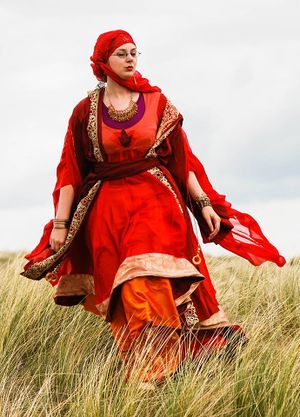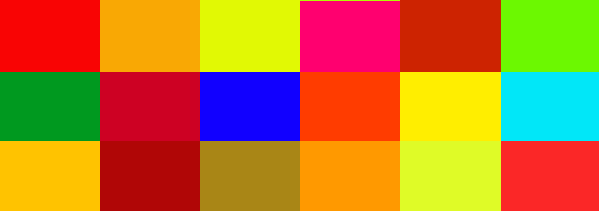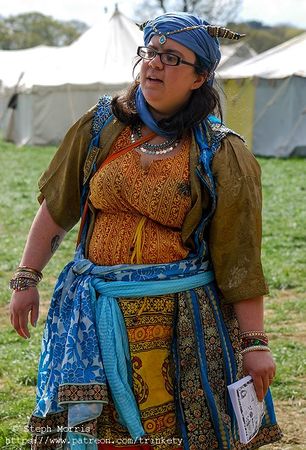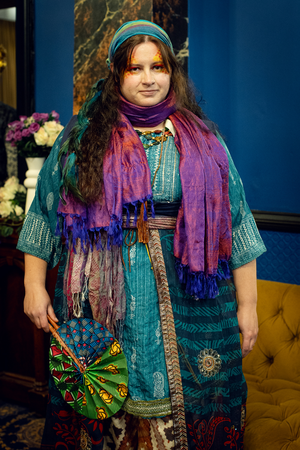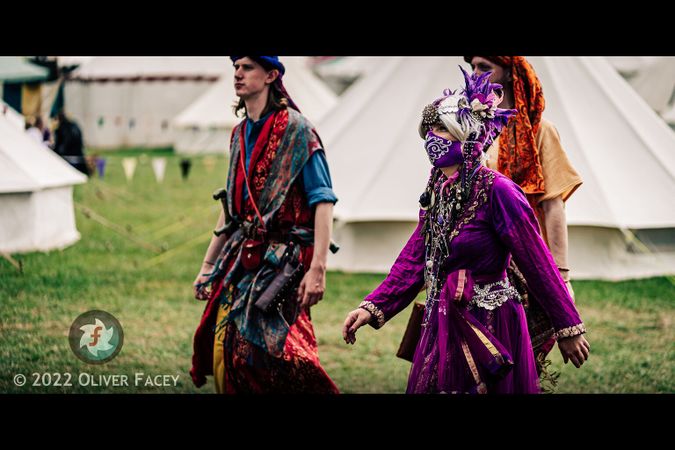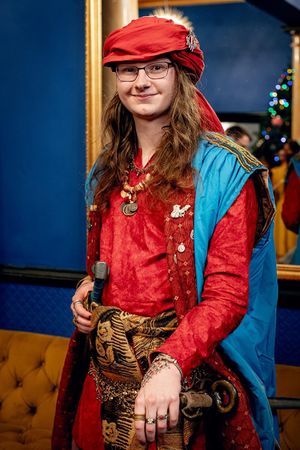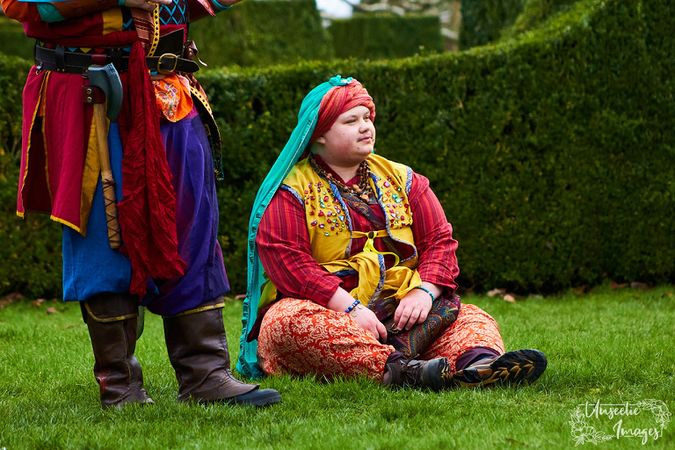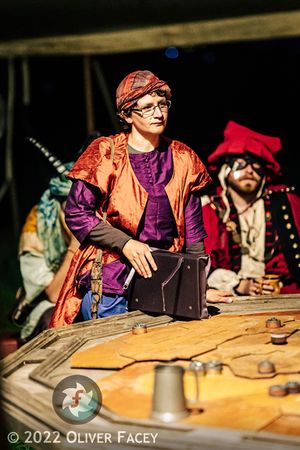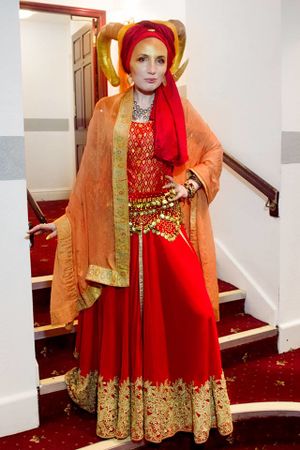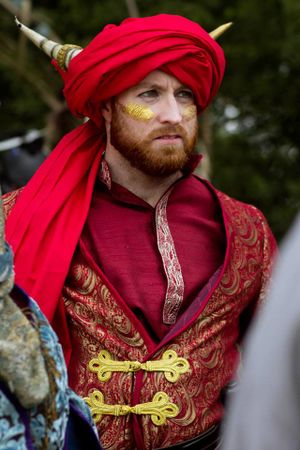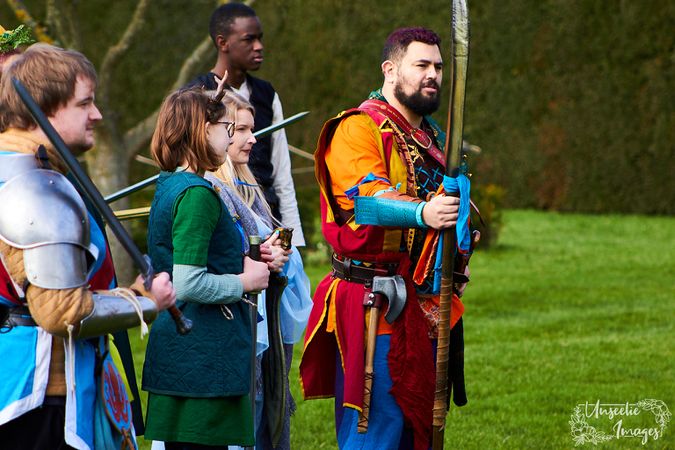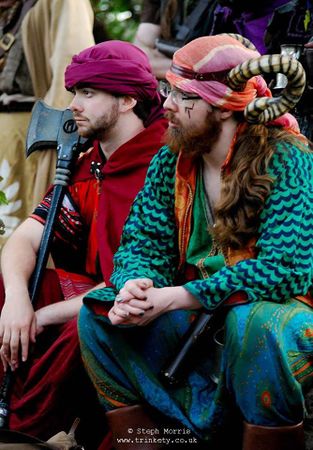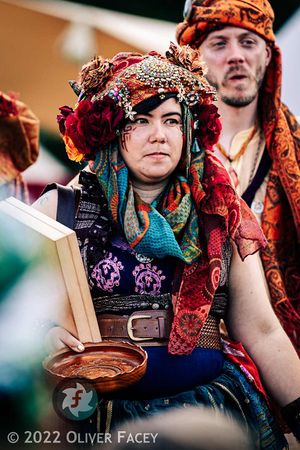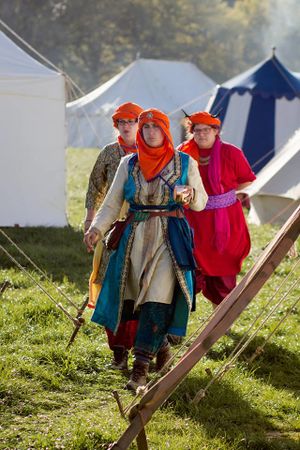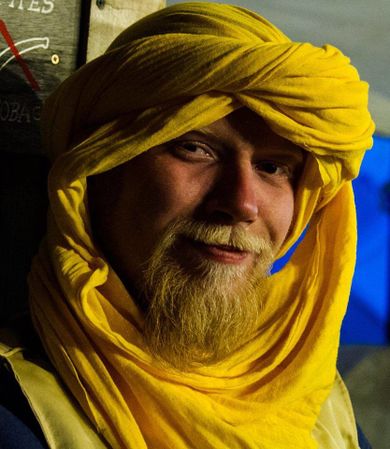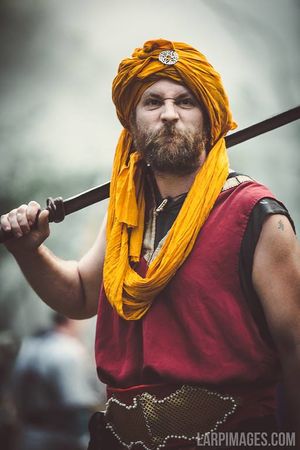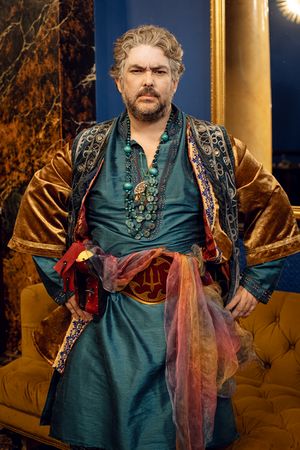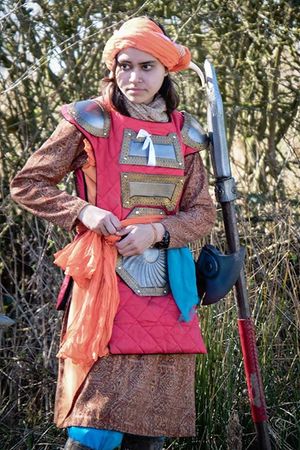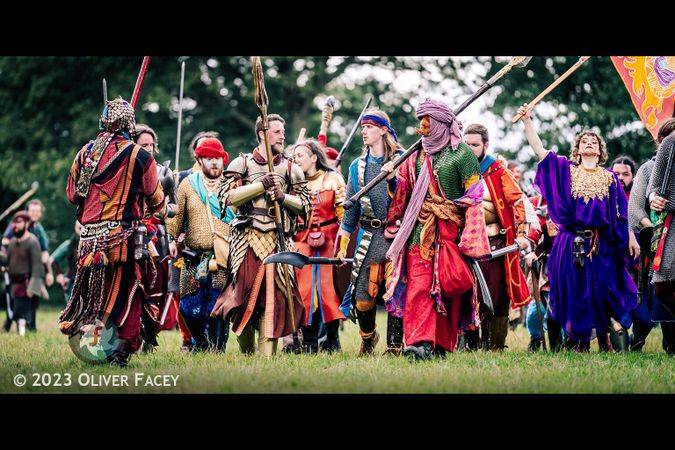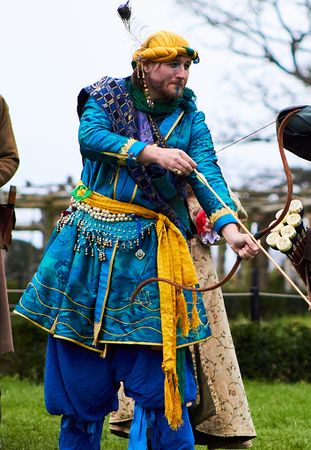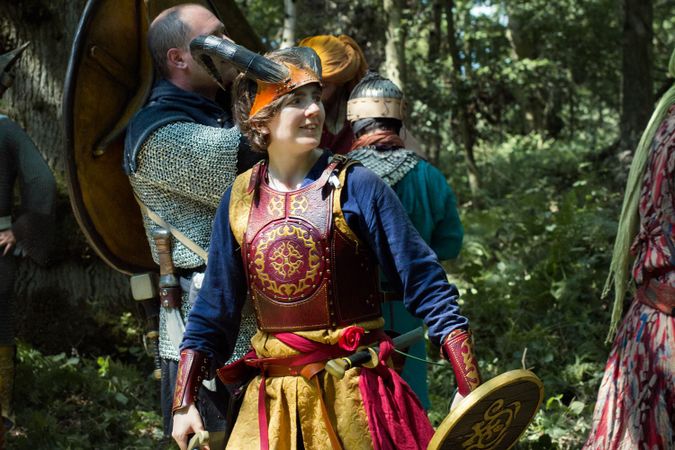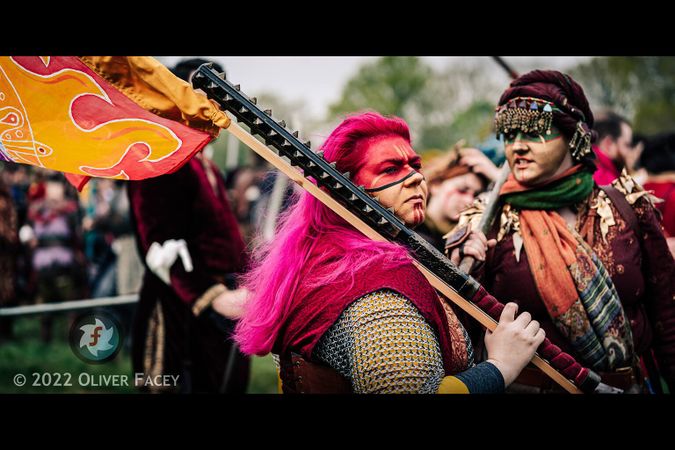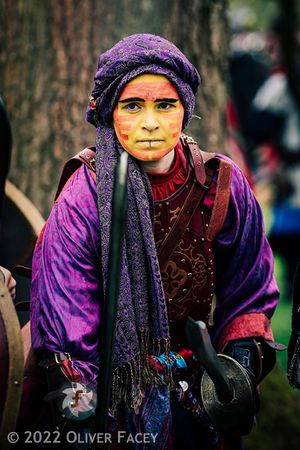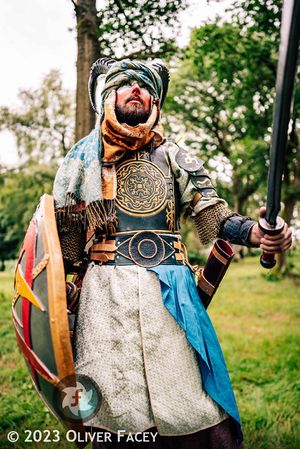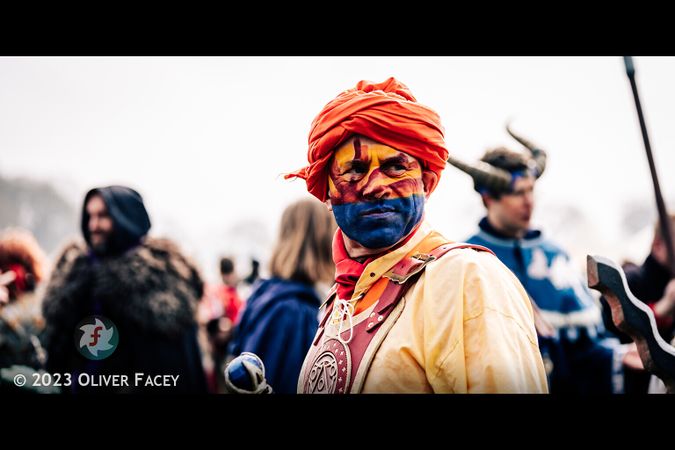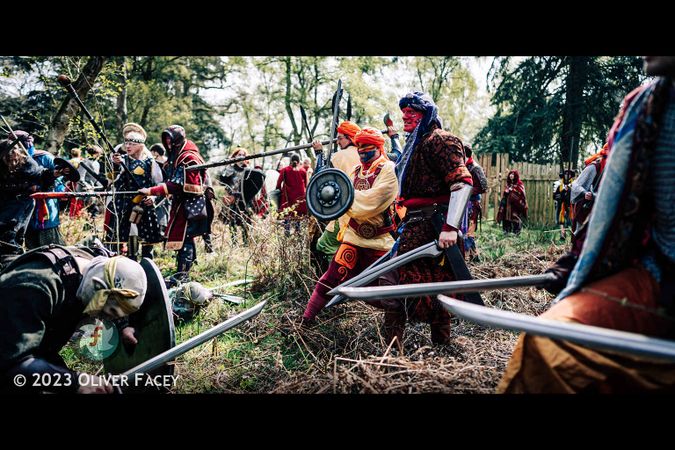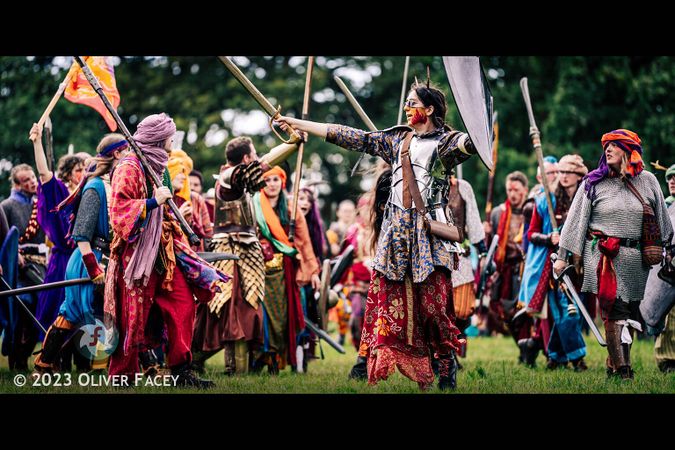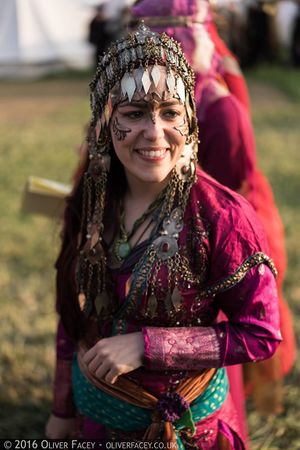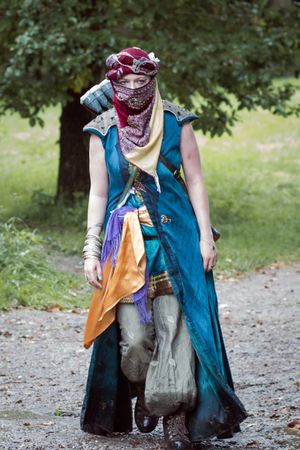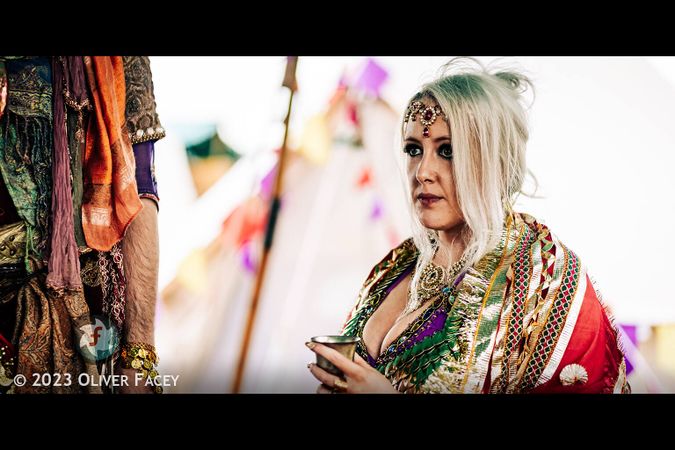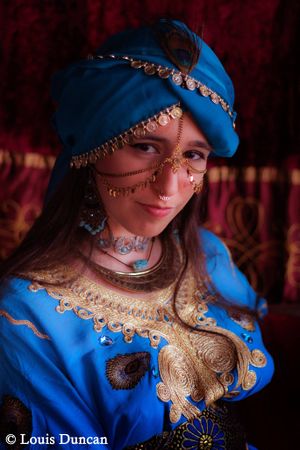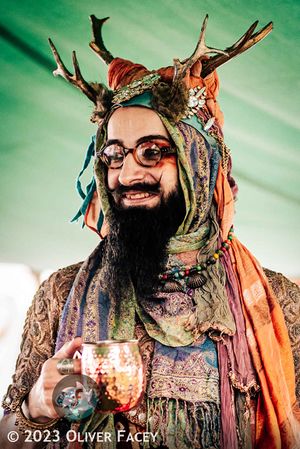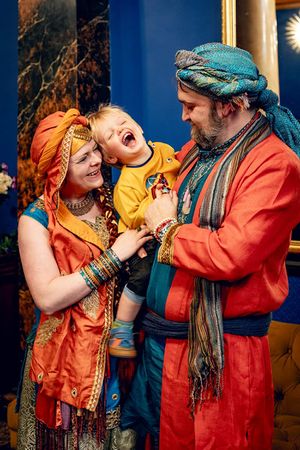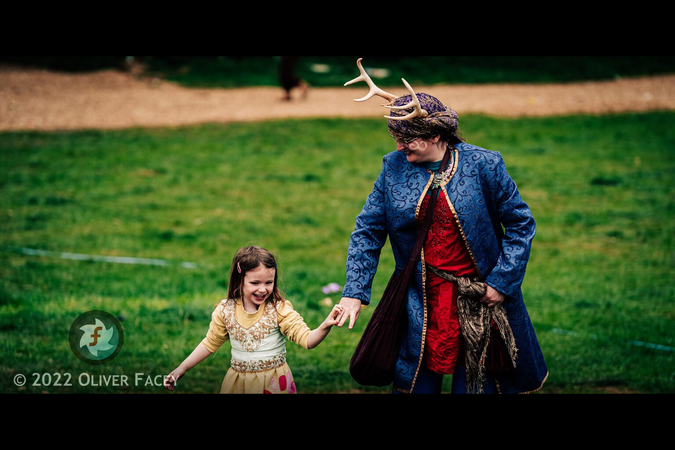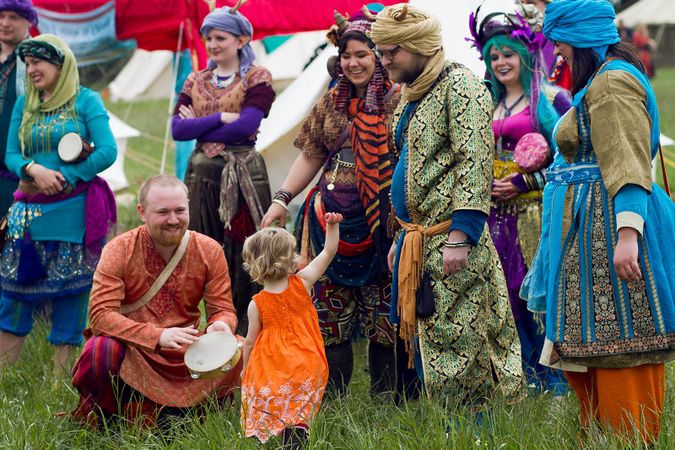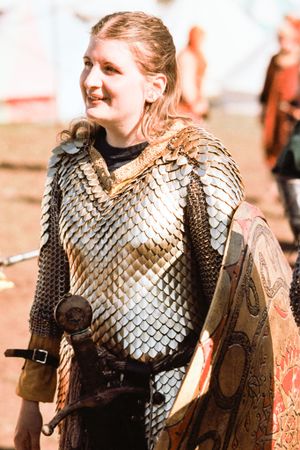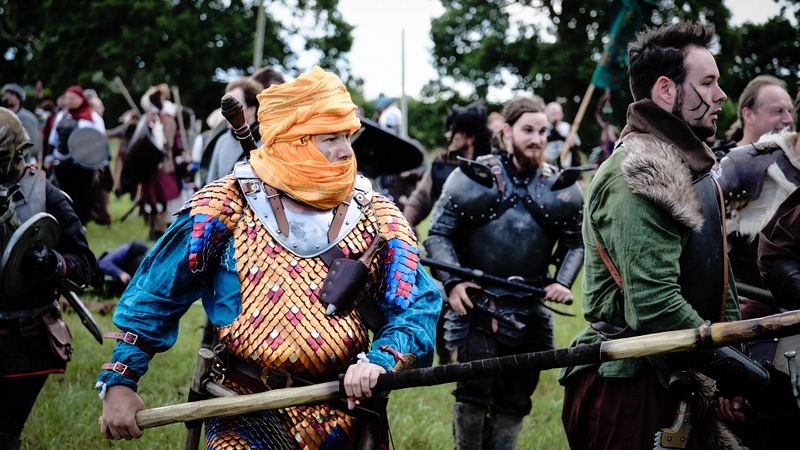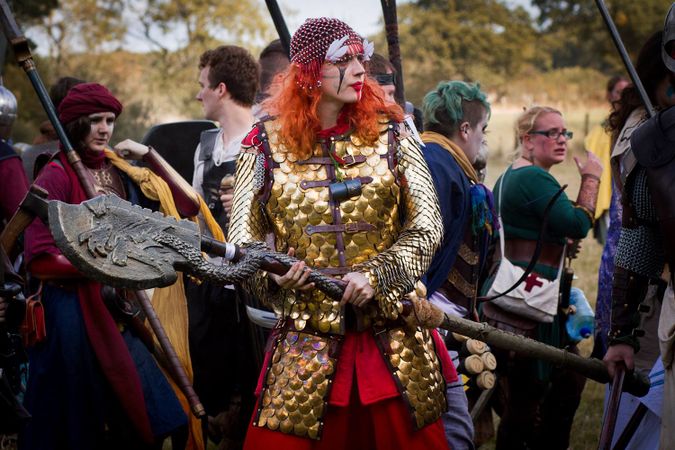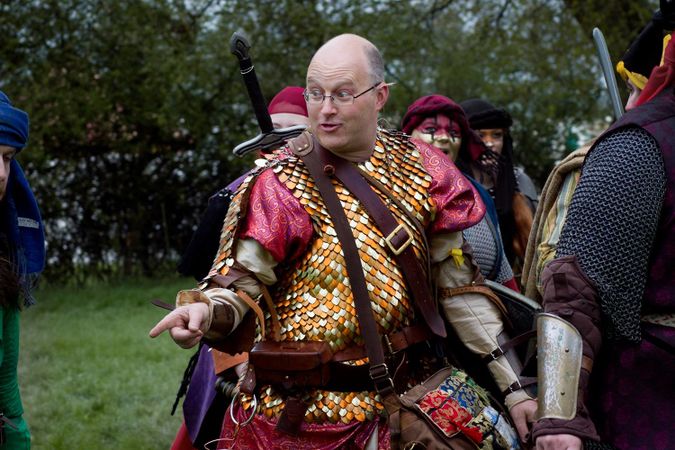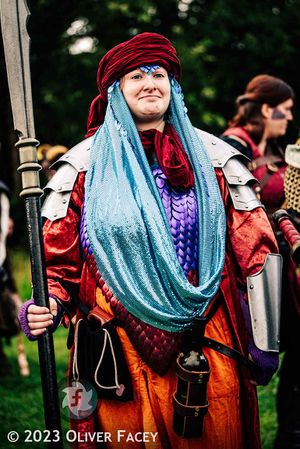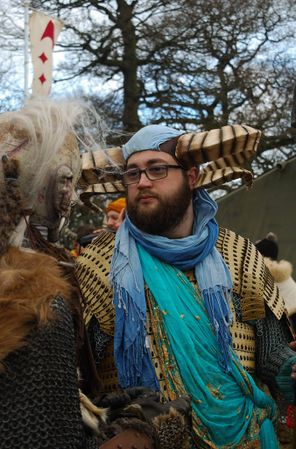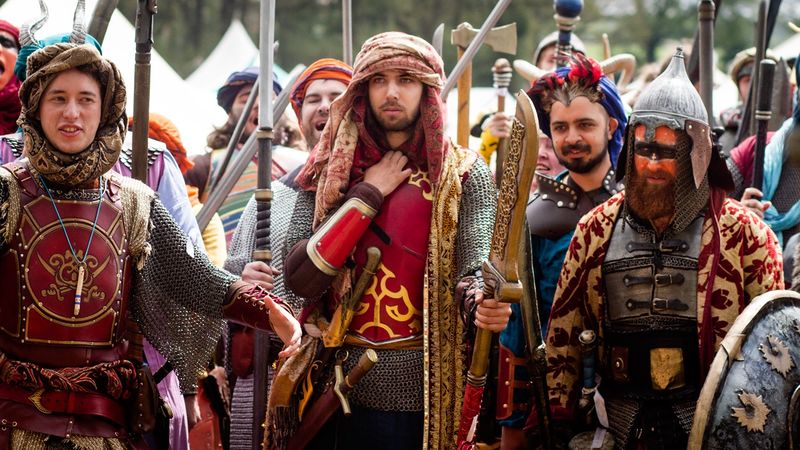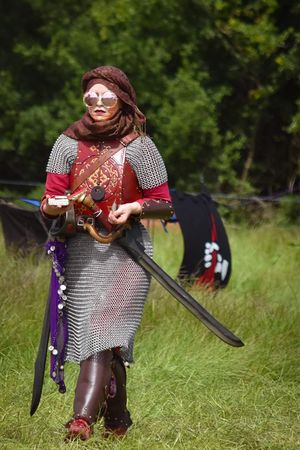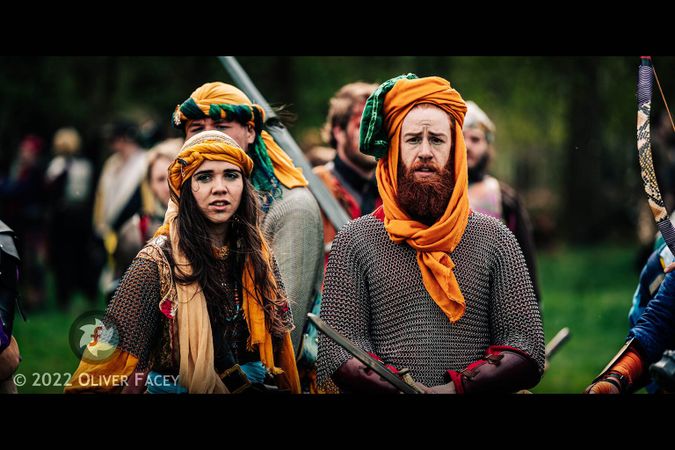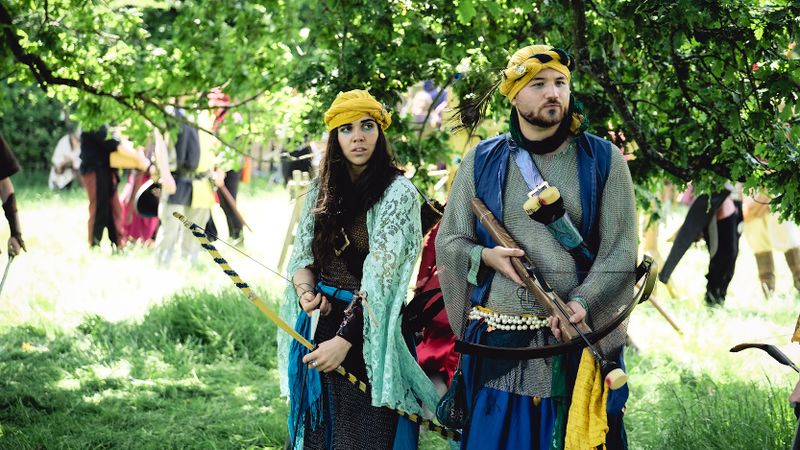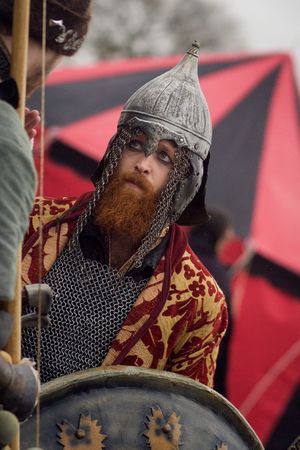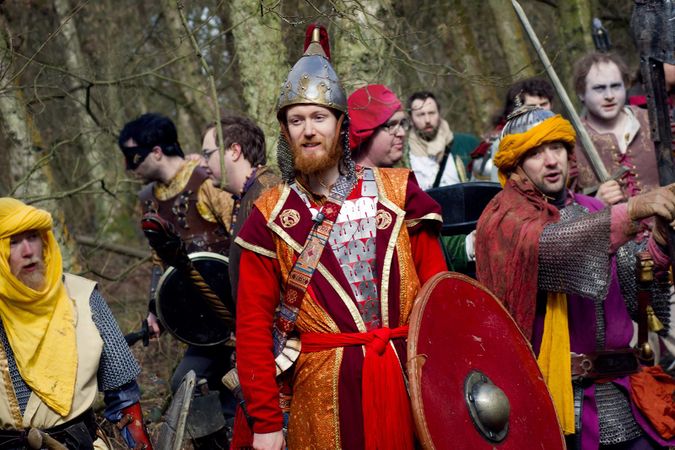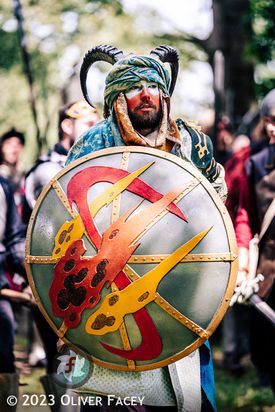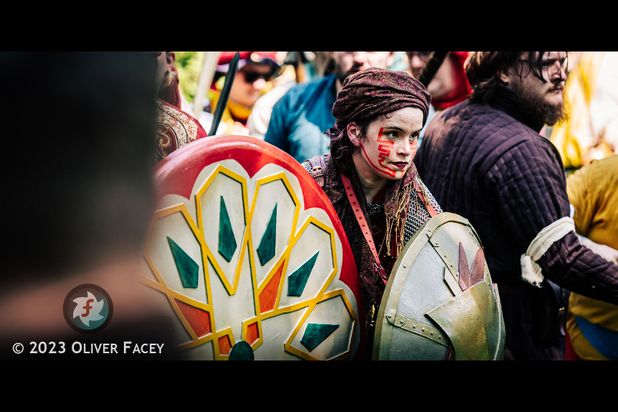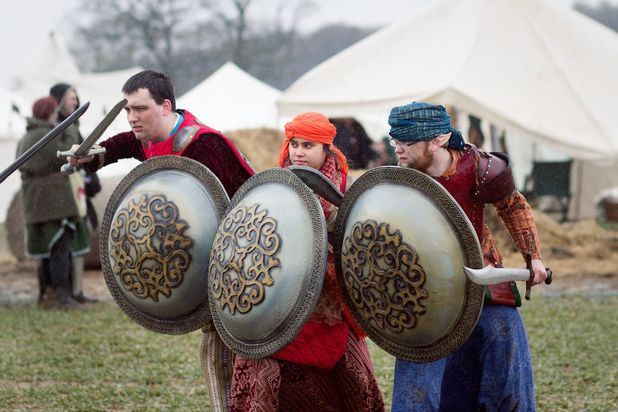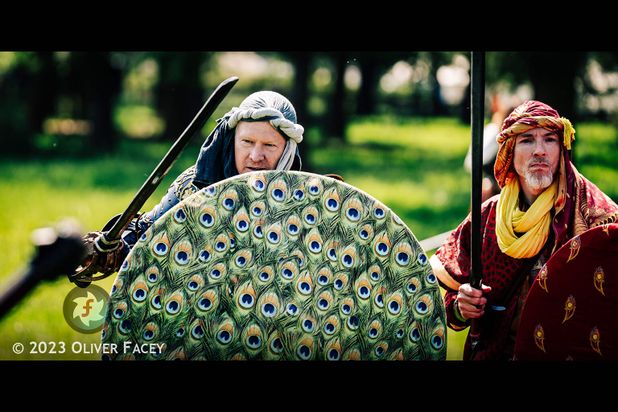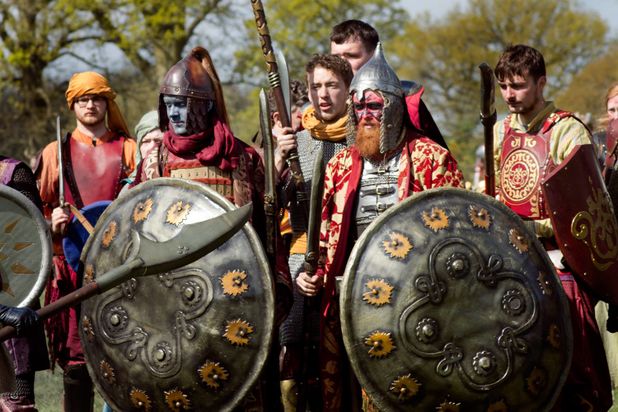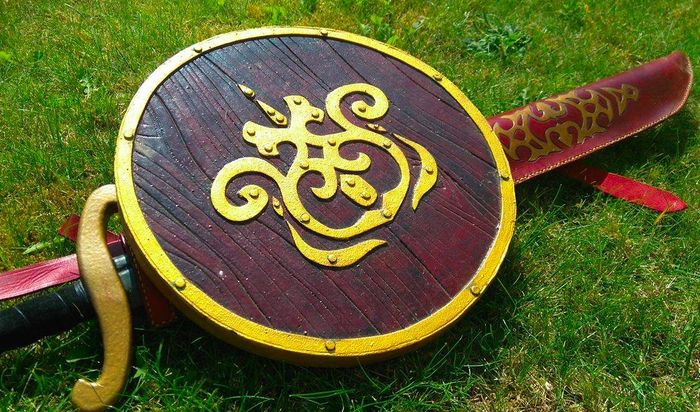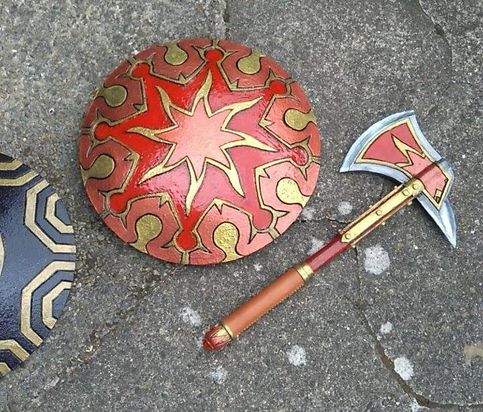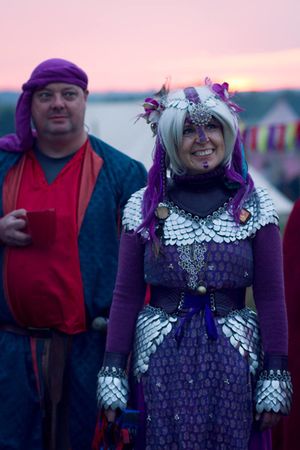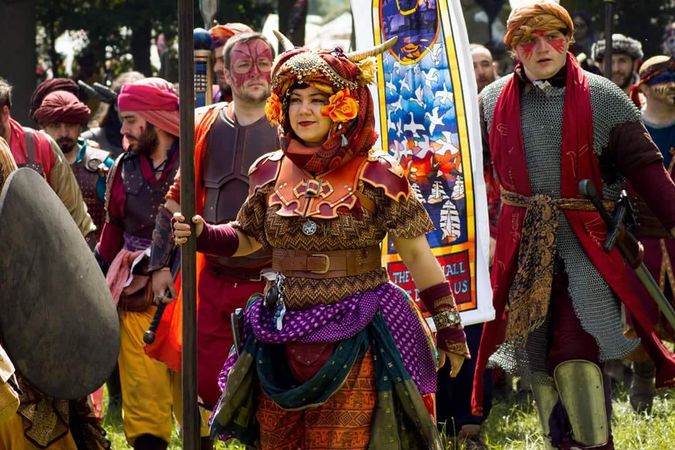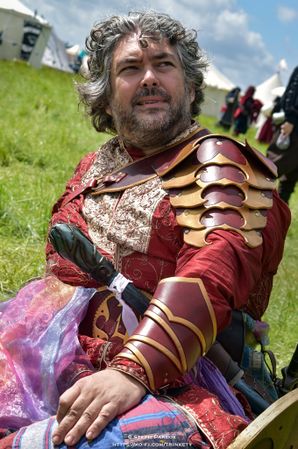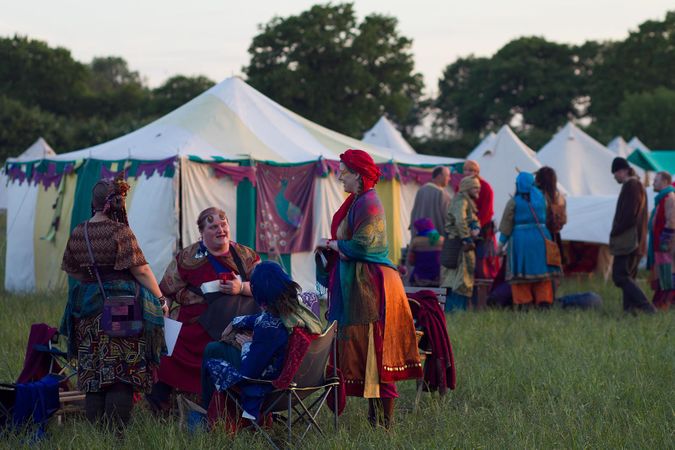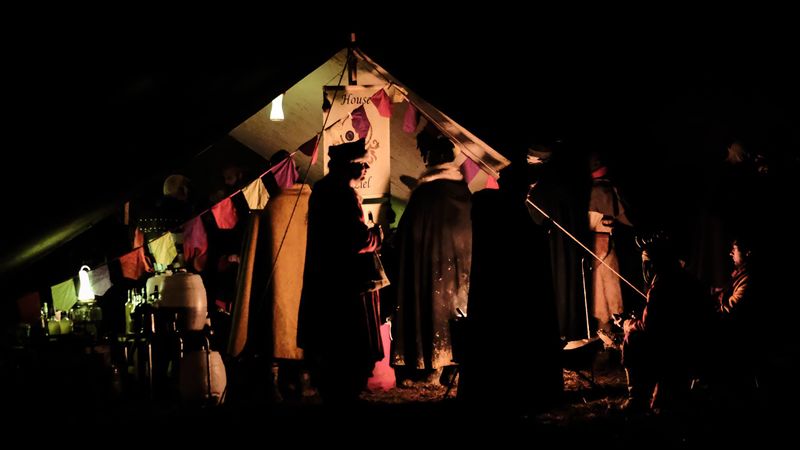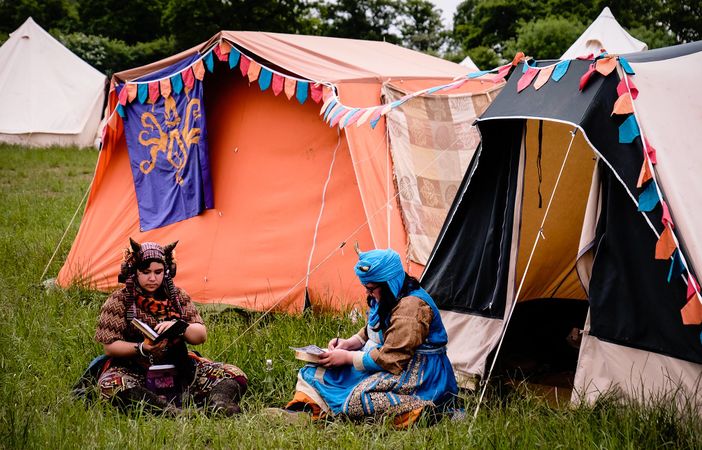The Brass Coast look and feel
Wildwinter (talk | contribs) m (moved Freeborn Look and Feel to Brass Coast Look and Feel) |
mNo edit summary |
||
| (356 intermediate revisions by 18 users not shown) | |||
| Line 1: | Line 1: | ||
{{CaptionedImage|file=CrimsonSeguran.jpg|title=Flowing fiery colours.|width=300|align=left}} | |||
==Overview== | ==Overview== | ||
'''Free, flowing, headstrong, sumptuous, practical, exuberant, hedonistic, colourful, rich, joyful. '''<br> | |||
The [[The Brass Coast|Freeborn]] look is one of bright colours, silks, jewels, and sumptuousness. They admire ornate or bejewelled items. To the Freeborn, a brilliant craftsman is one who can make something elegant as well as sturdy. Their weapons and armour are often engraved or adorned, but they are not fatuous and do not compromise utility for the sake of appearance. Jewellery is very common with the best pieces, like necklaces, crowns or tiaras, designed to frame the wearer's hands or face. | |||
The image of the flame is central to the Freeborn culture | The image of the flame is central to the Freeborn culture; they believe it represents their spirit: wild, powerful and unchained. | ||
''Also see [[The Brass Coast costumes]].'' | |||
==Breakdown== | ==Breakdown== | ||
<big>'''Influences</big><br> | |||
Moorish Spain, Morocco, Algeria, Tunisia | The traditional looks of Moorish Spain, Morocco, Algeria, Tunisia. | ||
<big>'''Colours</big><br> | |||
The Freeborn value bright, vibrant colours, especially the colours of flames: strong bright yellows, brilliant oranges and every conceivable shade of red as well as gold and silver. Peacock blue, magenta and turquoise often appear for contrast. Expensive clothing is made in brightly coloured layers to convey the impression of the fire within. | |||
{{CaptionedImage|file=Brass_coast_colours.png|width=|align=none}} | |||
Black is considered severe and used for shrouds to wrap the dead. White is the colour of the poor, those too impoverished to afford exotic dyes. | |||
<big>'''Materials</big><br> | |||
Lightweight fabrics such as voiles and chiffons, either silk or synthetic. Also silks, brocades and other rich fabrics. Leather is considered unappealing for most clothing, it is a heavy material mainly reserved for boots and armour. Gold is prized over silver when available. When working in colder climes, such as at sea, a warmer layer of fleece or wool is worn as a base layer. | |||
Gold, bronze and brass are much-prized, as are carved wooden objects (which are often imported, given the lack of wood on the Coast). | |||
<big>'''Weapons</big><br> | |||
Curved swords are less common than straight swords and axes which are the preferred weapons. The bhuj, a large heavy single-bladed spear, is the ideal polearm. The best quality weapons are intricately etched and engraved with complex designs. The [[hakima]] often have their rods, wands and staves made of finely carved wood. These featuring flame designs and are topped with red, orange or gold crystals. | |||
== | ==Clothing== | ||
Veils, scarves, head-wraps, pantaloons, loose shirts and kaftans, are all part of Freeborn garb. Clothing is usually worn loose with layers of draped material slashed through to show a wealth of colour, and secured with sashes rather than belts. Outfits will often be decorated with shiny jewellery, bells, coins showing wealth in the glint of metal in the sun and the sound of metal as the wearer moves. Scabbards or pouches tend to hang at the waist by a silk cord that goes over the shoulder. Many Freeborn favour sandals as footwear, lacing up over the foot or higher up the leg, but slipper shoes are also common. Leather boots to mid-calf or the knee are favoured particularly on the battlefield. | |||
<gallery heights=300 mode="packed"> | |||
Safya.jpg | |||
Fancy Freeborn.png | |||
Striding Freeborn.jpg | |||
Fine Red Headscarf.jpg | |||
Sitting Freeborn.jpg | |||
War Scout Tirsa in MC.jpg | |||
Freeborn Cambion.jpg | |||
Metal and Cloth.jpg | |||
Freeborn with Layers.jpg | |||
Seated Freeborn.jpg | |||
</gallery> | |||
== | ===Headscarves=== | ||
The ideal headgear is the [http://en.wikipedia.org/wiki/Tagelmust tagelmust] (preferably in bright red, orange or yellow rather than blue). | |||
The | <gallery heights=300 mode="packed"> | ||
Disappointed Sutannir.jpg | |||
Dhomiro.jpg | |||
CorsairZanterr.jpg | |||
Raul.jpg | |||
</gallery> | |||
=== | ===Corsairs=== | ||
[[Corsair|Corsairs]] epitomise Freeborn daring and adventure. Javelins and bows are common but the Catazarri crossbow is also used. Many are lightly armoured decorated with flaming reds and oranges, but the boldest show off their success with ornately gilded plate. They may dress more simply than other Freeborn in trousers and tunic using Bright colours and patterned fabrics, but their flair for wealth tends to show through with jewellery worn at wrist and neck. | |||
<gallery heights=300 mode="packed"> | |||
Posing Corsair.jpg | |||
KrakenfireCorsair.jpg | |||
Corsairs Planning.jpg | |||
Aiming Corsair.jpg | |||
Cambion_Corsair_Chic.jpg | |||
</gallery> | |||
=== | ===Kohan=== | ||
As with any Freeborn, [[kohan]] usually dress as extravagantly as possible. What really sets them apart from other Brass Coast warriors however is their use of facepaint. Vivid colours are used, often in threatening designs, the better to unnerve their enemies. There is a wide variety of designs across the faces of the Coast, some kohan groups keeping their masks of war the same over decades of battle with others changing it day by day as their feelings take them. | |||
A kohan band may cultivate a uniform look to their [[costume]] - generally through the use of colour. A given band is likely to pick one or two shades and encourage its members to wear clothing in these colours, leaving it up to the individual to determine the exact cut and style. | |||
The | Some kohan take valuable trinkets from particularly impressive fallen enemies, generally pieces of jewellery. The more striking these items are, the more opportunities they give to tell stories about how they were acquired. . | ||
<gallery heights=300 mode="packed"> | |||
Posing Kohan.jpg | |||
Readied Kohan.jpg | |||
Cambion Kohan.jpg | |||
Glaring Kohan.jpg | |||
Fierce Kohan.jpg | |||
Tempting Kohan.jpg | |||
</gallery> | |||
=== | ===Jewellery and Decoration=== | ||
Jewellery is commonly used either as part of the clothes themselves or to frame the face or hands to draw attention to them. Veils are fashionable for those who wish to appear mysterious and alluring. Those who go tattooed tend to favour intricate henna-style designs. | |||
<gallery heights=300 mode="packed"> | |||
BrassCoastBlingHat.jpg | |||
BrassCoastVeil.jpg | |||
Bejewelled Freeborn.jpg | |||
Sharazhad.jpg | |||
Bejeweled Changeling.jpg | |||
</gallery> | |||
=== | ===Children=== | ||
Children are an opportunity for parents to show off their wealth, dressing their offspring in traditional Freeborn styles. | Children are an opportunity for parents to show off their wealth, dressing their offspring in traditional Freeborn styles. | ||
<gallery heights=300 mode="packed"> | |||
Family Freeborn.jpg | |||
Headstrong Freeborn and parent.png | |||
FreebornToddler.jpg | |||
</gallery> | |||
=== | ==Armour== | ||
===Scale=== | |||
Scale is the armour many Freeborn aspire to, ideally in a bright golden colour, worn like mail or else secured with leather. Where mail is worn, it is usually likewise a bright golden colour, or worn under or over a brightly coloured tunic. | |||
<gallery heights=300 mode="packed"> | |||
FreebornScale.jpg | |||
Brass Coast Scale.jpg | |||
Golden Scales.jpg | |||
Burnished Scales.jpg | |||
Scaled and Plated Freeborn.jpg | |||
GeneralElias.jpg | |||
</gallery> | |||
== | ===Mail=== | ||
Mail in the janissary style, particularly the chain helmets, is also commonly seen. Small pieces of plate or breastplates are popular especially if ornate and inlaid. Armour, whether metal or leather, usually has embellished edges and rich decoration, with calligraphy and ornate designs. | |||
<gallery heights=300 mode="packed"> | |||
Freeborn chain.jpg | |||
Delora8162.jpg | |||
Chilly Orange Freeborn.jpg | |||
Freeborn Archers.jpg | |||
FreebornHelmet.jpg | |||
FreebornHelmets.jpg | |||
</gallery> | |||
=== | ===Shields=== | ||
The | The Freeborn favour round (ideally domed) metal shields, highly decorated if possible. Gold inlay and engraving are both particularly popular. | ||
<gallery heights=275 mode="packed"> | |||
Triple Comet Shield.jpg | |||
Double Fancy Shield.jpg | |||
FreebornShieldwall.jpg | |||
Peacock Shield.jpg | |||
Kohan.jpg | |||
Freeborn Shield.jpg | |||
FreebornAxeAndBuckler.jpg | |||
</gallery> | |||
=== | ===Mage Armour=== | ||
Freeborn battlemages favour [[Weapons_%26_armour#Mage_Armour|mage armour]] that elicits the same themes as other armour; scales, brightly dyed leathers, and other materials in rich colours. | |||
<gallery heights=300 mode="packed"> | |||
FreebornMageArmour.jpg | |||
Proud Colours.jpg | |||
Red Gold Mage Armour.jpg | |||
</gallery> | |||
=== | ==Camp== | ||
<gallery heights=300 mode="packed"> | |||
FreebornCamp.jpg | |||
FreebornShelter.jpg | |||
FreebornScrivener.jpg | |||
</gallery> | |||
[ | ==Less Appropriate== | ||
[ | {{OffBrief|nation=the Brass Coast}} | ||
<row-fluid> | |||
<span4> | |||
===Avoid: Shemagh=== | |||
Some of the costume inspiration for the Brass Coast comes from cultures with strong Arabic influences, but the focus was Moorish Spain and North Africa. The [http://en.wikipedia.org/wiki/Keffiyeh shemagh or keffiyeh], the traditional headscarf that is white or patterned is more typical of the Middle East and often looks very modern. We recommend the tagelmust as the ideal head covering for the Brass Coast. | |||
{{ThreeColIconImage|file=BrassNoShemagh.jpg|width=200}} | |||
</span4> | |||
<span4> | |||
===Avoid: Sartorial Hijab=== | |||
All items of clothing associated with [http://en.wikipedia.org/wiki/Sartorial_hijab sartorial hijab] are excluded from the look and feel for the nation. They are inappropriate as costume for Empire. They should not be worn in-character by anyone, unless you would normally do so in real life. | |||
{{ThreeColIconImage|file=BrassNoHijab1.jpg|width=200}} | |||
</span4> | |||
<span4> | |||
===Avoid: Belly Dancing Costumes=== | |||
Although there are no particular modesty taboos, dancers tend to be far more interested in showing off how they can make fabrics flare and move than displaying their own flesh. Wild passionate dancing is a common Freeborn pursuit for people of any gender, but the perfect Freeborn costume features long flowing colourful garments. [https://www.youtube.com/watch?v=3xlJMavnO-g Roxanne's dance] from the movie Alexander is a great inspiration for Freeborn dancing and costume. | |||
{{ThreeColIconImage|file=Bellydancer.jpg|width=200}} | |||
</span4> | |||
</row-fluid> | |||
{{Brass Coast Links}} | |||
Latest revision as of 20:26, 12 July 2025
Overview
Free, flowing, headstrong, sumptuous, practical, exuberant, hedonistic, colourful, rich, joyful.
The Freeborn look is one of bright colours, silks, jewels, and sumptuousness. They admire ornate or bejewelled items. To the Freeborn, a brilliant craftsman is one who can make something elegant as well as sturdy. Their weapons and armour are often engraved or adorned, but they are not fatuous and do not compromise utility for the sake of appearance. Jewellery is very common with the best pieces, like necklaces, crowns or tiaras, designed to frame the wearer's hands or face.
The image of the flame is central to the Freeborn culture; they believe it represents their spirit: wild, powerful and unchained.
Also see The Brass Coast costumes.
Breakdown
Influences
The traditional looks of Moorish Spain, Morocco, Algeria, Tunisia.
Colours
The Freeborn value bright, vibrant colours, especially the colours of flames: strong bright yellows, brilliant oranges and every conceivable shade of red as well as gold and silver. Peacock blue, magenta and turquoise often appear for contrast. Expensive clothing is made in brightly coloured layers to convey the impression of the fire within.
Black is considered severe and used for shrouds to wrap the dead. White is the colour of the poor, those too impoverished to afford exotic dyes.
Materials
Lightweight fabrics such as voiles and chiffons, either silk or synthetic. Also silks, brocades and other rich fabrics. Leather is considered unappealing for most clothing, it is a heavy material mainly reserved for boots and armour. Gold is prized over silver when available. When working in colder climes, such as at sea, a warmer layer of fleece or wool is worn as a base layer.
Gold, bronze and brass are much-prized, as are carved wooden objects (which are often imported, given the lack of wood on the Coast).
Weapons
Curved swords are less common than straight swords and axes which are the preferred weapons. The bhuj, a large heavy single-bladed spear, is the ideal polearm. The best quality weapons are intricately etched and engraved with complex designs. The hakima often have their rods, wands and staves made of finely carved wood. These featuring flame designs and are topped with red, orange or gold crystals.
Clothing
Veils, scarves, head-wraps, pantaloons, loose shirts and kaftans, are all part of Freeborn garb. Clothing is usually worn loose with layers of draped material slashed through to show a wealth of colour, and secured with sashes rather than belts. Outfits will often be decorated with shiny jewellery, bells, coins showing wealth in the glint of metal in the sun and the sound of metal as the wearer moves. Scabbards or pouches tend to hang at the waist by a silk cord that goes over the shoulder. Many Freeborn favour sandals as footwear, lacing up over the foot or higher up the leg, but slipper shoes are also common. Leather boots to mid-calf or the knee are favoured particularly on the battlefield.
Headscarves
The ideal headgear is the tagelmust (preferably in bright red, orange or yellow rather than blue).
Corsairs
Corsairs epitomise Freeborn daring and adventure. Javelins and bows are common but the Catazarri crossbow is also used. Many are lightly armoured decorated with flaming reds and oranges, but the boldest show off their success with ornately gilded plate. They may dress more simply than other Freeborn in trousers and tunic using Bright colours and patterned fabrics, but their flair for wealth tends to show through with jewellery worn at wrist and neck.
Kohan
As with any Freeborn, kohan usually dress as extravagantly as possible. What really sets them apart from other Brass Coast warriors however is their use of facepaint. Vivid colours are used, often in threatening designs, the better to unnerve their enemies. There is a wide variety of designs across the faces of the Coast, some kohan groups keeping their masks of war the same over decades of battle with others changing it day by day as their feelings take them.
A kohan band may cultivate a uniform look to their costume - generally through the use of colour. A given band is likely to pick one or two shades and encourage its members to wear clothing in these colours, leaving it up to the individual to determine the exact cut and style.
Some kohan take valuable trinkets from particularly impressive fallen enemies, generally pieces of jewellery. The more striking these items are, the more opportunities they give to tell stories about how they were acquired. .
Jewellery and Decoration
Jewellery is commonly used either as part of the clothes themselves or to frame the face or hands to draw attention to them. Veils are fashionable for those who wish to appear mysterious and alluring. Those who go tattooed tend to favour intricate henna-style designs.
Children
Children are an opportunity for parents to show off their wealth, dressing their offspring in traditional Freeborn styles.
Armour
Scale
Scale is the armour many Freeborn aspire to, ideally in a bright golden colour, worn like mail or else secured with leather. Where mail is worn, it is usually likewise a bright golden colour, or worn under or over a brightly coloured tunic.
Mail in the janissary style, particularly the chain helmets, is also commonly seen. Small pieces of plate or breastplates are popular especially if ornate and inlaid. Armour, whether metal or leather, usually has embellished edges and rich decoration, with calligraphy and ornate designs.
Shields
The Freeborn favour round (ideally domed) metal shields, highly decorated if possible. Gold inlay and engraving are both particularly popular.
Mage Armour
Freeborn battlemages favour mage armour that elicits the same themes as other armour; scales, brightly dyed leathers, and other materials in rich colours.
Camp
Less Appropriate
To define the ideal look and feel for the Brass Coast we have deliberately chosen to exclude some themes. This is important because it helps to create a clear visual aesthetic for the nation. The goal is to make members of the nation visually distinct from the other nations in play and to ensure that the costume guidelines don't become diluted by including ideas for costume from similar sources. We explicitly define some costume ideas and inspirations as not part of the brief for the Brass Coast to make what definitely does fit the brief clearer and more distinct.
Most things that are not part of a nation's brief are considered to be less appropriate as they are not not strictly part of the costume brief. This means that you can still use them if you need to but they are not something that you should actively aim for when you are creating or buying something for your the Brass Coast character. Creating a costume is always a compromise as time and money are limited, so it is sensible to use a garment or prop that is less appropriate if you already own it, if that allows you to focus on improving other parts of your costume.
A few things are explicitly defined as inappropriate. These are things that you should not use when you are in-character at an event, because of the real-world connotations or imagery associated with them. We have deliberately omitted these elements because they are so striking and memorable that it is impossible to see them without thinking of the themes associated with them.
Whilst this look and feel page provides the ideal costume for the nation, it is important for players to familiarise themselves with the general costume rules for further guidelines, including those for inappropriate costume.
Avoid: Shemagh
Some of the costume inspiration for the Brass Coast comes from cultures with strong Arabic influences, but the focus was Moorish Spain and North Africa. The shemagh or keffiyeh, the traditional headscarf that is white or patterned is more typical of the Middle East and often looks very modern. We recommend the tagelmust as the ideal head covering for the Brass Coast.
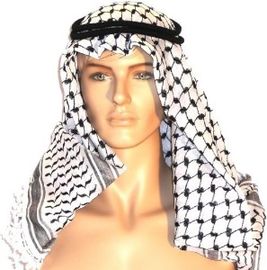
Avoid: Sartorial Hijab
All items of clothing associated with sartorial hijab are excluded from the look and feel for the nation. They are inappropriate as costume for Empire. They should not be worn in-character by anyone, unless you would normally do so in real life.
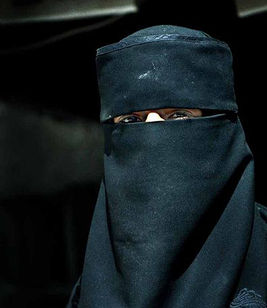
Avoid: Belly Dancing Costumes
Although there are no particular modesty taboos, dancers tend to be far more interested in showing off how they can make fabrics flare and move than displaying their own flesh. Wild passionate dancing is a common Freeborn pursuit for people of any gender, but the perfect Freeborn costume features long flowing colourful garments. Roxanne's dance from the movie Alexander is a great inspiration for Freeborn dancing and costume.
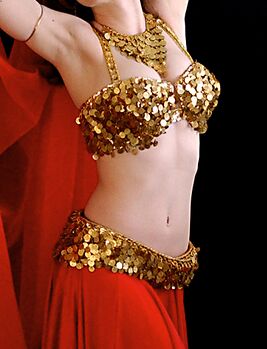
Further Reading
Core Brief
Additional Information
